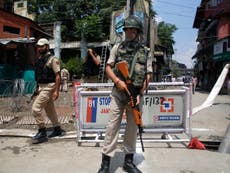Jammu and Kashmir legislature passes resolution asking India to restore its special status
Indian-controlled Kashmir’s regional legislature has passed a resolution demanding the federal government restore the disputed region’s semi-autonomy

Your support helps us to tell the story
From reproductive rights to climate change to Big Tech, The Independent is on the ground when the story is developing. Whether it's investigating the financials of Elon Musk's pro-Trump PAC or producing our latest documentary, 'The A Word', which shines a light on the American women fighting for reproductive rights, we know how important it is to parse out the facts from the messaging.
At such a critical moment in US history, we need reporters on the ground. Your donation allows us to keep sending journalists to speak to both sides of the story.
The Independent is trusted by Americans across the entire political spectrum. And unlike many other quality news outlets, we choose not to lock Americans out of our reporting and analysis with paywalls. We believe quality journalism should be available to everyone, paid for by those who can afford it.
Your support makes all the difference.Jammu and Kashmir’s regional legislature passed a resolution on Wednesday demanding the federal government to restore the region’s special status that was scrapped by Prime Minister Narendra Modi’s administration in 2019.
The assembly passed the nonbinding resolution by a majority vote to noisy scenes in the house.
“This assembly calls upon the government of India to initiate dialogue with elected representatives of people of Jammu and Kashmir for restoration of special status,” the resolution read.

Modi’s Bharatiya Janata Party, which has 29 members in the 90-seat assembly, rejected the resolution. It requires the approval of Lt Governor Manoj Sinha, New Delhi’s appointed top administrator in Kashmir.
The National Conference party, which sponsored the resolution, came to power last month in the region’s first vote in a decade and the first since Modi’s Hindu nationalist government scrapped its semi-autonomy. The federal government also downgraded and divided the former state into two centrally governed union territories, Ladakh and Jammu & Kashmir.
The move — which largely resonated in India and among Modi supporters — was mostly opposed in Kashmir, including by the National Conference, as an assault on its identity and autonomy. Many fear it would pave the way for demographic changes in the region, which has since been on edge with civil liberties were curbed and media freedoms restricted.
The region continues to remain a ‘union territory’ — directly controlled by the federal government with India’s Parliament as its main legislator.
India and Pakistan each administer a part of Kashmir, but both claim the territory in its entirety. The nuclear-armed rivals have fought two of their three wars over the territory since they gained independence from British colonial rule in 1947.
Militants in the Indian-controlled portion of Kashmir have been fighting New Delhi’s rule since 1989. Many Muslim Kashmiris support the rebels’ goal of uniting the territory, either under Pakistani rule or as an independent country.
India insists the Kashmir militancy is Pakistan-sponsored terrorism. Pakistan denies the charge, and many Kashmiris consider it a legitimate freedom struggle. Tens of thousands of civilians, rebels and government forces have been killed in the conflict.
Modi and his powerful home minister, Amit Shah, have repeatedly stated that the region’s statehood will be restored after the election, without specifying a timeline. However, they vowed to block any move aimed at undoing the 2019 changes.




